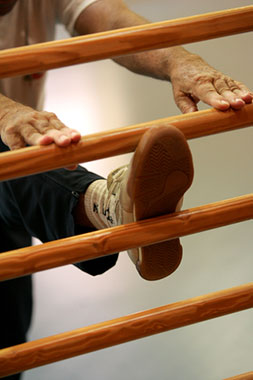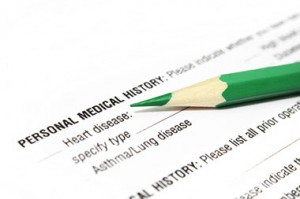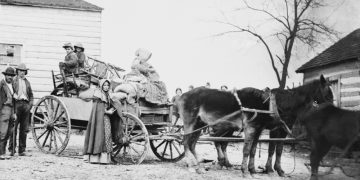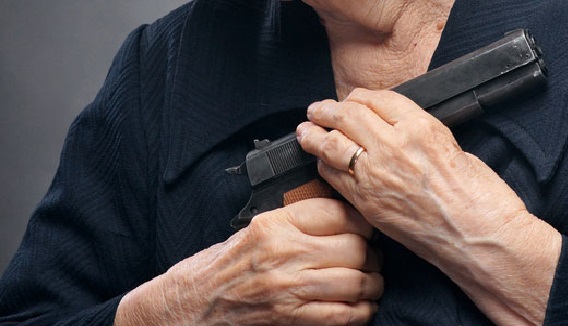Surviving a SHTF situation as a healthy 35-year-old is tough enough but if you happen to be a bit more seasoned, your hill just got a little steeper. Don’t worry about it though – there are many things that you can do to counterbalance the years; it may just take a bit more preparation and forethought. Also, don’t forget that knowledge and experience can’t be replaced by youth, so you still have a tremendous advantage!
Throughout the following paragraphs, we’re going to touch on some steps that you can take to get prepared for a SHTF scenario no matter how old you are. We didn’t think it was necessary to include such tips as, “Know what disasters are probable” or “Know your community resources” because those are the no-brainers.
Knowledge is power, so on to the meat of the topic – an easy preparedness plan for the oldies out there!
Stay Physically Fit
 The advantage that a fit, healthy body gives you in a SHTF scenario can’t be overstated so do what you need to do to stay in shape. Not only will your body be better able to run, jump, climb or simply endure, you will also avoid many of the diseases of affluence that accompany declining health.
The advantage that a fit, healthy body gives you in a SHTF scenario can’t be overstated so do what you need to do to stay in shape. Not only will your body be better able to run, jump, climb or simply endure, you will also avoid many of the diseases of affluence that accompany declining health.
The obvious downside to being fat and unhealthy is that you lose your stamina, flexibility, speed, and endurance.
Remember the old saying about running from a predator – you don’t have to be the fastest, you just have outrun the slowest guy! We joke about it but it’s true!
Possibly the worst disadvantage that comes with losing your health is that you’ll most likely need medication of some sort. Insulin, high blood pressure medication, heart pills, cholesterol meds: all life-sustaining medications that probably won’t be in ready supply if the SHTF.
Since these meds are almost 100% avoidable by eating right and exercising, it’s just good prepping to stay healthy. Why handicap yourself unnecessarily when survival is going to be hard enough?
Consider your Physical Condition When Planning
The fact of the matter is that if your health is going to determine your prepping plan. If you know that you can’t run fast enough to escape or stay out in the elements for a week while you’re bugging out, you need to plan for that. Grand plans that look good on paper won’t keep you alive – realistic preparation will. Here are a few things to consider when prepping:
- Create escape routes that you can actually navigate.
- If you know you can’t bug out, prepare your house so that you have everything you need to batten down the hatches and bug in.
- If you use a wheelchair that operates on a battery, make sure that you have a manual back-up.
- If you wear contacts or glasses, have back-ups.
- Stockpile any medications that you use but make sure to rotate your supply to avoid expiration.
- Make sure that you can manage your bug-out bag by yourself – if it’s too heavy, repack it.
- If you have medical conditions such as diabetes, heart problems, etc., wear a medical ID bracelet or necklace. First responders need every second that they can get to save your life in an emergency situation.
Develop a Community Network
An old saying something along the lines of “many hands make light work” is certainly applicable here. Though you may not be able to lift logs or fight bears off one-handed, you have plenty to contribute and it’s likely that others in your community will want to work together too, so put the word out and start building a network.
Make a plan to check on each other immediately after the SHTF, or even establish a common location where everybody will weather the event together if there’s notice. Have a strategy that defines each neighbor’s role in the plan. By working and prepping together, everybody’s chance for survival increases.
Prepare Your Bug-Out Vehicle and Stockpile More Carefully
If you’re planning on bugging out but need a vehicle to do so, use it to your advantage.
Stock it well so that you don’t need as much weight in your standard bug-out bag and keep your weapons either in your bug-out vehicle if you’re licensed or at the ready so that you can easily toss them in when SHTF. Have everything else already packed in there so that you can just get in and go.
If you’re going to need the assistance of others to survive, pack or stockpile plenty of items that you can use for trade such as food, toilet paper, or cosmetic items.
If you read accounts from people who have lived in warzones or survived natural disasters, one of the common threads that they discuss is how much getting clean again meant to them. You’re going to be surprised at just how much a bar or soap or tube of toothpaste is worth after somebody hasn’t had it for a while, so have trade items to make up for what you can’t do physically!
Your Brain is a Weapon and a Trade Item
We’ve already discussed the fact that even though you may be limited physically, your knowledge is incredibly valuable. Use that to your advantage. Once disasters happen, people panic. Even if you’re physically hindered, people will still look to you for direction if you stay calm and know what to do. That’s an invaluable tool to people who are terrified.
Use your knowledge to everybody’s advantage by jumping in right from the start and establishing yourself as a leader. It’s a tool that you’ve worked hard to earn over the years – use it.
Age may require you to modify your preparation plans a bit but as long as you keep your head in the game, you’ll be at least as ready as the next person. Before we close, we’d like to reiterate the importance of staying healthy and establishing a network in your community.
These two tools are vital to survival in a SHTF scenario as you age, and may even save the younger pups in the neighborhood, too! Good luck and get prepared!
This article has been written by Theresa Crouse for Survivopedia.
Photo source: Dreamstime.






















































































thanks for this article, I am an old fart who has preps for “whatever” might arrise. not so much in the shoot em up bang bang category, but a good base of beans, bandaids, and water.
Glen Buddy,
Don’t sell yourself short in the ‘Shoot em up category’. Even if all you get is a .22 with a HIGH capacity magazine or 2 or 3 or 4. Also you might consider a few guns that someone else could use to help you out when the time comes. And the time is coming……….
Getting older means more preparing, and less thinking you’ll just handle whatever comes along.
As an older parent I appreciate all the geriatric based information. I have yet to see any articles on parents with very young kids (ours are 2 and 4). Not only am I in my 50’s and a bit slower than 20 yrs ago but I know I will not be humpin’ it double time through the back country with a wife and 2 kidlets… Yes, I’ve thought of bunkers, etc. Any input/ideas would be greatly appreciated. Thanks
Ages 2 and 4 with you in your 50s, I’d say you need to plan for bugging in. That said, you also need to check alternatives. Find ‘friend’ preppers so if you have to bug out, you can go to their place or vice versa. Look at your home from the street and do an honest evaluation of how someone could ‘invade’ your home, where could you plan on putting supplies outside as well as inside but disguised (hiding in plain sight) camouflaged. As your children grow, do spontaneous camp ins; outdoor campouts in the yard, then going camping. When I say camping, I mean rustic survival drills not what is generally thought of as camping these days.
This way you are teaching your children what they are capable as well as making it so w/o being told they know some of what to do.
I am now in a wheelchair, yet my family still does bug out drills both inside and out. I would not fare well with just me to depend on but having started camping with my children before they could walk. I have no doubt they could and would survive whether I did or not. O and also include in that teaching and drilling, what to do if something happens to you. This way it’s not a forbidden topic, just a part of living and dying. Kids are resilient when they are prepared.
Thanks Deez (-;
Find and read Howard Ruff’s book (Ruff Times) and articles written about 40 years ago. I followed his advice.
If you want a big bore handgun, stay with the revolvers, cause when you hit 80 the 1911’s get too hard to rack, and the magazines to load. A 12 GA shotguns is awesome, but a bit much with a 8 round magazine.
Hone some skill that just everybody doesn’t have and then when the “Big Dog” comes to town (and he will, they always do), maybe you can convince him that you deserve his patronage in return for those things you can do for him. Electrician, auto mechanic, medical, etc., useful things that the elite Bachelor of Arts cannot give him.
Last summer I opened a ham steak from an MRE dated 1997 from my Y2K stash and it made a decent sandwich.
Stocking Rx’s is getting difficult to do, I would recommend getting in good with your pharmacist ahead of TSHTF time and find out what he would take in swap, after the time.
when first thinking about being prepared, i placed much faith in the fact that my knowledge as a former ER nurse will be sorely needed…that said, i have not ignored the other aspects of preparing…knowledge is king…you can store stuff, but if you don’t know how to use it…if we can stay healthy and alive, i think that those who make it through whatever, will come to value our knowledge just like we valued our elders…i thank my depression era grandparents for teaching me frugal ways, and miss them every day, they would be so helpful to have around these days, but they taught me well
I had my 69th birthday earlier this month, but I am in good health and have been self reliant all my life. I am a man who was never particularly strong, but I can always find a way to make things happen if I need to. Self reliance is not a physical condition, but a state of mind. I am writing this to ask that you elaborate on ways to establish a community network. My weakest skills are those relating to other people, and there are few people I know who believe there is any danger of social, monetary collapse, or government collapse. I have significant skills that others might my help, but I don’t know how to identify them.
Bill, I have a similar problem. I’m an introvert which means I don’t have a large number of friends. I recently read that one way of starting the discussion is you are talking with someone. Ask them what they would do in *name the disaster* happened to them? Their family? This is how I’m doing it right now. In addition to asking what they would do, as you and they talk, you can find out if they camp, do they garden, what type of hobbies they have. Basically it’s getting to know someone so at a certain point you can ask them if they are planning for a future during and after a disaster; be it family, local, natural or man-made.
I too have skills and I am finding many who don’t have similar skills and don’t plan/prep. If they aren’t interested, I keep looking. It’s like dating, I think, it takes getting out there and getting to know people. You might also do a search for local prepper meetings. I just did a local search on the internet and found there are none listed for my community. Another idea—I’m going to be taking CERT training in my town, I’m hoping I may find a few interested through that training. One thing, if you feel you don’t relate well, as you meet people (this may be difficult) but let people know what you’re capable of. It’s not about boasting, it’s about letting people know what an asset you would be during and after a collapse. As you meet people, it’s the practice which will help you ID those you want to be around and whose skills and abilities will complement yours. Least that’s what I’m hoping for myself.
Over the years, I have bought numerous books of how-to info…and read them as I went along. One thing that I have done a lot of research on is herbal medicine. I am surprised that so many people have never heard of Arnica Montana. It is a plant that can be grown in a greenhouse…I think. Has anyone out there ever done that? I call arnica my all purpose smash and bash magic herb, and it is great for everything from a sprained ankle to gunshot wounds…speaking from personal experience. I have tubes of it all over the house, including in my purse. It works by speeding up the rate at which the body removes the by – products of tissue trauma. If you can remember to put it on while screaming curses at your spouse say, because he accidentally hit you in the arm with a sledgehammer while pounding in tomato stakes from a 6 ft ladder, and the head flew off, you won’t even have a bruise…again, speaking from experience. I have never met anyone who was allergic to it, and my BOB has the biggest tube of it that I could find. Please, if anyone has ever grown it, tell me how! 🙂
Heidi – just do an internet search on “Arnica Montana seeds”. There are several places that sell it- also called Wolf’s bane, Leopard’s bane, mountain arnica. The formulas you purchase have controlled amounts of the herb. If you are growing it and consuming it, you must be careful about quantities since it can be toxic, even deadly, if taken in large doses. Since it is a wild plant, grown in mountains, I think it would be very easy to grow in hardiness zones 5-8. You can get more information on the on this from the sites that sell the seeds. Good luck, -Linda
I am old enough to where, if I were to die tomorrow, I would not be missing much. But I am still young enough to put up a hell of a fight before I do. Yet a lot of us in our 50s and 60s are taking care of ones in their 70s and 80s, and therein lie the challenges. My particular focus has been on preparing the children and grandchildren as well as myself. They are the ones who must survive. We are the expendables. But that is the beauty of it. They will remember that we taught them, warned them, and provided for them, even when they could not or would not do it for themselves. If they live, we might get some parks named after us someday. But even if they don’t, they’ll run to us in Heaven and we’ll praise Jesus together for His gift of salvation. Because the FIRST element of preparedness, if you are 8 or 80, is preparation to meet Jesus. You want Him to recognize you when you do.